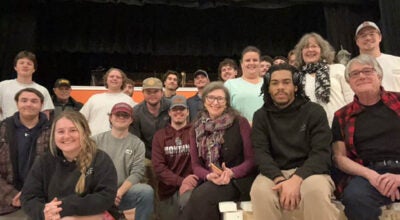Criticism of PE 2nd Amendment sanctuary meeting
Published 9:37 am Tuesday, January 21, 2020
Two members of the public spoke during the Prince Edward County Board of Supervisors’ regular January meeting to criticize the board’s handling of its reconvened meeting Dec. 17 that addressed the Second Amendment Sanctuary issue. This criticism prompted responses from several supervisors, led by Farmville 701 District Supervisor Jim Wilck, who was board chairman in 2019.
The first member of the public to speak at the Jan. 14 meeting was Lee Bidwell, who also spoke at the Dec. 17 meeting, which was held in the large Barbara Rose Johns Auditorium at Prince Edward County High School.
“I’m here tonight to comment on the undemocratic way in which the board managed the specially called meeting on the sanctuary city proposal last month and to offer constructive ideas for how to avoid such problems in the future,” she said.
Noting that other problems with how the meeting was handled were addressed in letters to the editor, Bidwell said, “One of the most troubling aspects of the meeting was the inconsistently enforced demand that speakers publicly give their address, especially to an audience of almost 600 gun-toting, self-proclaimed sharp shooters.
“I have read the Prince Edward County rules of the Board of Supervisors as amended January 2014, not an item you voted on this evening,” she continued. “I see there is a provision under XIII, Public Hearings, that ‘all speakers shall come forward and identify themselves by name and address before stating their position.’
“I urge the board to amend that policy,” she added. “The purpose of the address provision is to establish (that) the speaker lives in the county. I implore the board to amend the policy to allow speakers to provide proof of residence in some other fashion, perhaps privately to the clerk or deputy clerk. Citizens should not feel that their personal safety is put at risk to be able to express their views.”
She cited that intimidation suppresses free speech.
Later she addressed the fact that there were two proposed resolutions being considered with regard to the Second Amendment, the first proposal leaving out the term “sanctuary” and the second including it.
“Robert’s Rules of Order require that after a motion is made and seconded that the chair call for discussion,” Bidwell said. “No call for discussion of the second proposal was made that evening. Not surprisingly, Mr. Wilck, the alternative motion, which was considered first, you did call for a discussion, and then you took that opportunity to speak against it. Ironically, much of the crowd seemed satisfied with the alternative (motion) until you pointed out that it did not specifically include sanctuary city language.
“With the motion you supported, you did not call for any discussion and went straight to the vote, demonstrating clear bias and unwillingness to consider alternatives or amendments to the proposal,” she added. “It was very clear that your mind, as well as the mind of most of the members of the board, was made up prior to the hearing.”
She stated that the purpose of a public hearing is to listen to citizens’ input before making an informed decision.
“When I spoke with Mr. Wilck on the phone the day after the meeting — Mr. Wilck, you might remember that conversation because before hanging up on me, you told me I had a ‘faulty one-sided memory’ — he told me that, indeed, he had already made up his mind because he had ‘spoken to about 80 people on the street,’” she said. “All of them except two, he mentioned a retired Longwood professor and minister, were in favor of the proposal, he told me.
“I didn’t know that in order to have my voice heard I would have to seek out members of the board in informal conversation,” she added. “I expected that true to democratic principles, I would be allowed to express my opinion in a scheduled public forum. Instead, I learned I must find a way to make my way into the good ‘ol boy network of the board.
“Clearly, the whole specially called meeting was not about hearing citizen input for the purpose of making an informed decision,” she continued. “The purpose of the meeting was to give the appearance of a democratic process, but the outcome of the vote was determined before the meeting ever started.”
In conclusion, Bidwell said, “The board needs to adopt policies, procedures and leadership behaviors that allow for civil, respectful public exchange of ideas, and board members must base their voting decisions on thoughtful, careful consideration of all constituents.”
Speaking after Bidwell at the Jan. 14 meeting was Ian Danielsen, who also spoke at the reconvened meeting in December.
After making clear his respect for Wilck and the board in general, followed by a brief introduction, Danielsen said, “In short, last month’s meeting was a fiasco. It is not accurate to call it a public hearing because so many who were in support of the resolution were allowed to disrupt and prevent opponents from freely speaking. The meeting turned instead into more of a one-sided rally.
“For example, when my peer, Susan, attempted to give comment, she was so roundly and hostilely booed, jeered and shouted down, she respectfully requested that this time denied her be reinstated, a rightful request that was not afforded to her,” he continued. “When the clock reached zero, she was again shouted down by the unruly crowd as she left abruptly, in tears, being essentially drummed out.
“My 9-year-old son, whom I brought with me so that he could see a civic hearing in action, was made so anxious by all of this that he climbed into my lap and implored us to leave,” he added.
He cited another example of what he described as tactics of intimidation used to hijack the process and deny opponents of the Second Amendment Sanctuary any real chance to speak.
“With respect, you didn’t maintain order among supporters of the resolution,” he said. “Hence, in one constituency’s defense of their Second Amendment rights, they trampled on another’s First Amendment rights.
“This is not a new strategy,” he continued. “Tragically, it’s all too common. It was planned, systematic and, worst of all, permitted. It was an unseemly and vulgar case in point of ‘freedom for me — but not for thee.’ In fairness, you apologized during our phone meeting, and I read with great interest your apology in The Herald.”
Wilck wrote a piece that was published as a column on the opinion page of The Herald in the Jan. 10 edition.
“But, sir, your apology never stated what should have been done or what would be done differently in the future, as apologies should do,” Danielsen said. “So I submit to you, respectfully, that with regard to this issue, we’re only halfway, at best, toward a resolution in this matter. There will be future meetings, and the integrity of these meetings will be assessed according to their ability and willingness to guarantee that all points of view will be heard without hostile interference.”
Then Danielsen shared his ideas of what should have been done.
“As I mentioned in our follow-up communication after the meeting, I felt you could have suspended comment of those in support of the resolution until the crowd demonstrated civility,” he said. “You could have ended the meeting altogether when it became clear that it was out of order. You could have utilized the resources of the sheriff’s officers to ensure order.
“I take on faith your statement that the extremism showed by the crowd was more than you or anyone expected, but to this I can only say that given the CSA’s systematic sanctuary circuit rides through Virginia counties this fall, you should have expected it,” he continued.
“I close by imploring that in future meetings that you will preplan your actions for ensuring order, fairness and equality,” he added. “We can expect more of the same from some of those constituencies, among whom many feel their ends justify their means. Because their means weren’t checked, they were instead reinforced, begging the question, ‘In what future settings will they use intimidation as a strategy to squelch viewpoints other than their own?’ Will they do that at future board meetings? Will they do that at voting precincts?”
When the time arrived later in the Jan. 14 meeting for supervisor comments, Wilck led them off.
“First, let me say about the meeting the other night, there is no one sitting on this board that has any blame other than myself,” he said. “I accept all of that, but I don’t accept nearly as much as Ms. Bidwell suggested. We were overwhelmed, or I was overwhelmed. We were expecting maybe 350 to 400 people.”
County Administrator Wade Bartlett confirmed there were 400 hard copies printed of the two proposed resolutions, made available to those attending the Dec. 17 meeting.
“There should have been enough there for all of you,” Wilck said, “If there was not, I apologize.”
Shifting his focus to the post-meeting phone call he received from Bidwell, Wilck said that during that call, she suggested that the only people that were asked their names during the reconvened meeting were the people that were opposed to the Second Amendment Sanctuary. Then he offered an explanation.
“The reason for that is there was a list of everybody else that was signed up: it had their name, their district and so forth,” he said. “So there was no need to (ask them). Whenever we have people speak, whether it’s here or whether it’s there, we need to get their name for the record. All of that’s done, it’s in the minutes and so forth.
“The other thing is, when you started to make accusations that were not true about what happened, I did hang up,” he continued. “You’re exactly right, because I figured there was no use to talk to you.
“Everything else I apologize for as far as anybody that was talked over,” he added. “I tried to stop that. I gaveled, I held my hand up and asked for a quorum. With 600 raucous people there — and it was a raucous crowd if you were there, anybody will tell you that — I had little effect.
“I’m not sure what I should have done,” he continued. “Should I have closed the meeting? I don’t think so. But perhaps I could have handled it better, and for that I apologized.”
He referenced his letter to the editor that became a column due to its length and highlighted the apology within it. He then noted the support he has received in the community with relation to the Dec. 17 meeting.
“I have been stopped in Walmart, I have been stopped on the street and thanked for the way I handled the meeting,” he said. “Was it perfect? No, absolutely not. But I do want to make it clear again that nobody up here is responsible — it’s strictly on my head.”
During Buffalo District Supervisor Llew Gilliam Jr.’s comments, he addressed Bidwell and Danielsen directly.
“To the lady and the gentleman, if you have a pen, I would like for you to write my cellphone number down,” he said. “I would like to speak to each one of you. I would like to hear what you have to say. I would like to hear your concerns. I would like to discuss it with you, and in turn, I would like you to hear mine.”
During his own comments, Leigh District Supervisor and Board Chairman Jerry R. Townsend said, “Mr. Danielsen and Ms. Bidwell, your voices are most definitely heard, and we appreciate your voice.”
Farmville 801 District Supervisor Pattie Cooper-Jones took time during her comments to say, “I thank you all for your participation. I thank you for coming to the gun sanctuary meeting. It was very much a disgusting action of how it was handled.”
She then quoted Wilck’s column on the opinion page of The Herald: “I asked Jerry Townsend and Pattie Cooper-Jones, who sat near me and voted differently from the way I voted, if they thought I had handled the meeting fairly, and they both responded, ‘Yes.’”
“That question was never asked of Pattie Cooper-Jones because Mr. Wilck did not speak to me,” Cooper-Jones said. “I heard him addressing Jerry Townsend, but that conversation never happened, because I did not think the meeting was handled fairly. But life goes on, we’re here to serve you and do what you need us to do and to serve the citizens of Prince Edward County. But that conversation never happened to me.”
Lockett District Supervisor Robert M. “Bobby” Jones used part of his comments time to say, “I hope we did learn something from that public hearing, because it did get out of control, and hopefully in the future, we can be better prepared for it. It was all of us, I guess we all should have maybe stepped up to bat and said, ‘Hey, calm the thing down.’”





